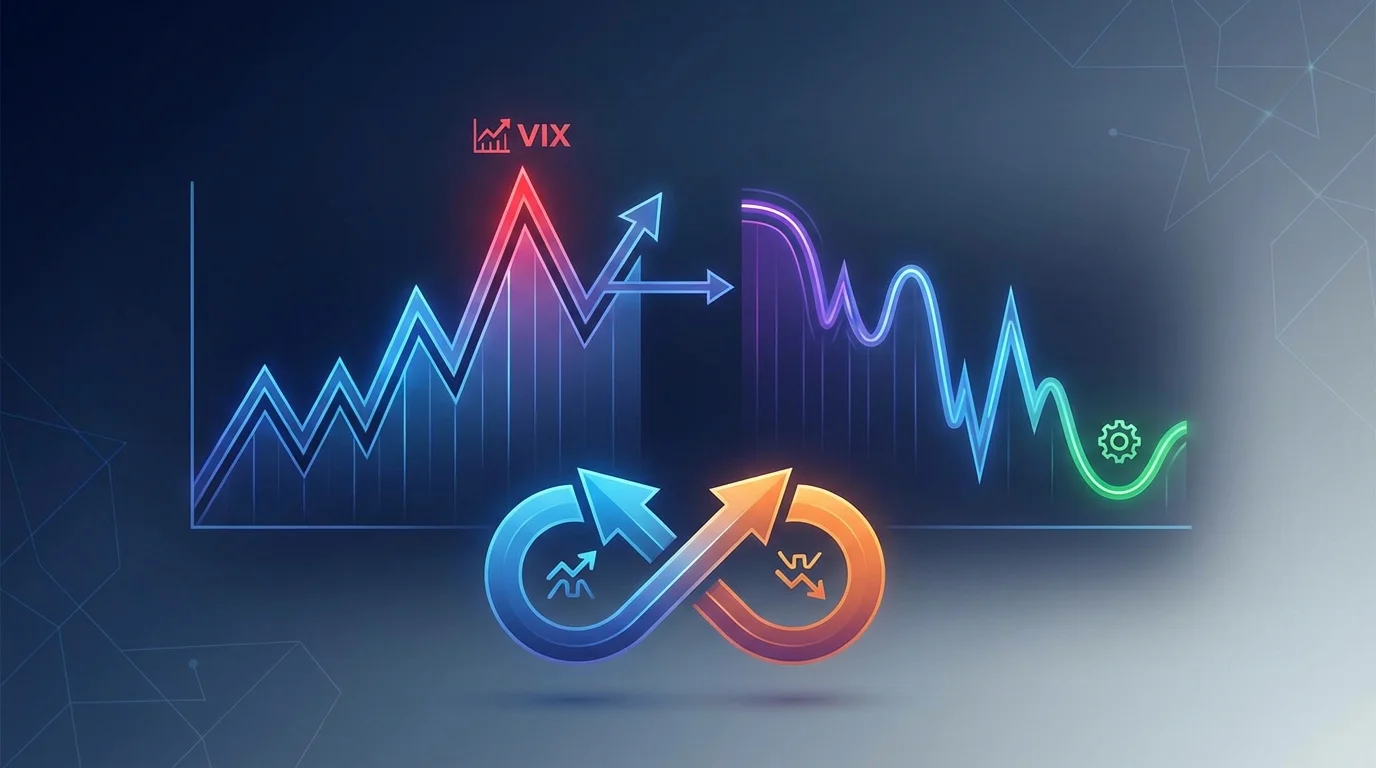Key Takeaways
- Generative AI is a rapidly growing sector, projected to reach $967.65 billion by 2032, offering significant investment opportunities.
- You can gain exposure through individual stocks like Amazon and Google or diversified ETFs like CHAT.
- AI tools like Intellectia.ai’s Stock Picker and Screener help identify high-potential generative AI investments.
- Diversification and risk management are crucial due to the sector’s volatility and regulatory uncertainties.
- Staying informed with AI-driven analytics can enhance your investment strategy in this dynamic market.
Introduction
Have you ever wondered how to tap into the explosive growth of artificial intelligence, specifically generative AI? With the market projected to soar, generative AI isn’t just a tech buzzword—it’s a game-changer reshaping industries like healthcare, finance, and marketing. As an investor, you might be eager to capitalize on this trend but unsure where to start. That’s where this guide comes in. Using the latest data and insights, we’ll explore what generative AI is, why it’s a compelling investment, and how you can pick the best stocks and ETFs. Plus, we’ll show you how platforms like Intellectia.ai can boost your strategy with AI-powered tools.
What is Generative AI?
Generative AI is a type of artificial intelligence that creates original content, such as text, images, videos, or even music, by learning patterns from vast datasets. Unlike traditional AI, which might analyze data to make predictions, generative AI produces new outputs. For example, ChatGPT by OpenAI generates human-like text, while DALL-E creates images from text prompts. These tools rely on advanced models like large language models (LLMs) and generative adversarial networks (GANs).
This technology is revolutionizing multiple industries:
- Healthcare: Generating synthetic medical images for diagnostic training.
- Finance: Creating synthetic data for risk assessment and fraud detection.
- Marketing: Especially when integrated into email marketing platforms to automate and personalize outreach at scale.
Its versatility makes generative AI a cornerstone of innovation, driving interest from investors looking for the next big tech opportunity.
Why Invest in Generative AI?
The generative AI market is on a steep upward trajectory. According to Fortune Business Insights, it’s expected to grow from $67 billion in 2024 to $967.65 billion by 2032, with an annual rate (CAGR) of ~40%. This explosive growth is fueled by its wide-ranging applications and the increasing adoption of AI across industries.
Key Reasons to Invest
- Market Growth: The projected $967.65 billion market by 2032 signals massive potential for returns.
- Industry Impact: From healthcare’s drug discovery to finance’s risk modeling, generative AI is transforming how businesses operate.
- Innovation Driver: Companies leveraging generative AI are at the forefront of technological advancement, attracting significant investment.
- Consumer Adoption: Tools like ChatGPT may have 700 million weekly active users (+4x YoY), showing rapid mainstream acceptance.
However, the sector isn’t without risks. Volatility, regulatory challenges, and ethical concerns around AI misuse could impact returns. Diversifying your portfolio and staying informed are essential to mitigate these risks.
Ways to Invest in Generative AI
Generative AI is revolutionizing industries, and investors have multiple avenues to capitalize on its growth. You can invest through individual stocks for targeted exposure, exchange-traded funds (ETFs) for diversification, or, for accredited investors, private equity or venture capital funds that back AI startups. Each method offers unique benefits and considerations, allowing you to tailor your investment strategy to your risk tolerance and financial goals. Below, you can explore these options in detail to help you navigate the dynamic generative AI market.
Individual Stocks
Investing in individual stocks allows you to target specific companies leading the generative AI charge. These companies are often at the forefront of innovation, offering significant growth potential, though they come with higher risk due to market volatility and company-specific factors. Here are some top publicly traded companies involved in generative AI:
- Amazon (AMZN): Through its cloud computing arm, Amazon Web Services (AWS), Amazon provides AI infrastructure and services like Bedrock, a platform for building and scaling generative AI applications. AWS’s dominance in cloud computing and Amazon’s vast customer base make it a strong contender. As of July 2025, Amazon’s market cap exceeds $1.9 trillion, reflecting its robust financial position.
- Alphabet (GOOGL): Google’s parent company, Alphabet, is a leader in AI research, with generative AI initiatives like Bard and Gemini enhancing its search and cloud offerings. Alphabet’s diverse portfolio, including advertising and cloud computing, generates tens of billions in free cash flow annually, making it a stable investment. It trades 25% below its fair value estimate of $237 per share as of July 2025.
- Microsoft (MSFT): A major investor in OpenAI, Microsoft integrates generative AI into Azure and products like Copilot. Its strategic partnerships and cloud infrastructure position it as a key player. Microsoft’s revenue grew to $245 billion in 2024, driven partly by AI advancements.
- Nvidia (NVDA): Nvidia’s GPUs are critical for training generative AI models, making it a backbone of the AI ecosystem. Its market cap reached $4 trillion+ in 2025, reflecting strong investor confidence. Nvidia’s role in AI hardware ensures sustained demand.
- CoreWeave (CRWV): A recent IPO in March 2025, CoreWeave is a pure-play AI infrastructure company, offering GPU cloud services for AI workloads. It serves clients like OpenAI and MistralAI, with revenue soaring to $2.71 billion in the trailing 12 months as of March 2025. Its focus on AI-specific cloud solutions makes it a unique investment opportunity, though its reliance on major clients like Microsoft (62% of 2024 revenue) introduces risk.
- Meta Platforms (META): Meta is advancing generative AI through its Llama language models, integrated across its social media platforms and smart glasses. Its focus on AI-driven advertising and virtual reality applications enhances its growth potential. Meta’s market cap was ~$2 trillion in 2025.
- Salesforce (CRM): Salesforce incorporates generative AI into its customer relationship management (CRM) tools, enhancing sales automation and analytics. Its leadership in CRM and adoption of AI technologies make it a compelling mid-cap option.
These companies vary in their AI focus, from infrastructure (Nvidia, CoreWeave) to applications (Microsoft, Meta, Salesforce) and platforms (Amazon, Alphabet). Investing in individual stocks requires thorough research, as their performance can be influenced by market trends, competition, and regulatory changes. Tools like Intellectia.ai’s Stock Monitor can help you track real-time performance and make informed decisions.
Exchange-Traded Funds (ETFs)
ETFs offer a diversified way to invest in generative AI, spreading risk across multiple companies and reducing the impact of any single stock’s performance. They are ideal for investors seeking exposure to the sector without the need for extensive research into individual companies. Here are some key ETFs:
- Roundhill Generative AI & Technology ETF (CHAT): Launched in May 2023, CHAT is the world’s first ETF specifically targeting generative AI. It holds approximately 50 companies, including Nvidia, Microsoft, and Alphabet, with a focus on firms driving AI innovation. As of June 2025, CHAT delivered an annualized return of 36%+ with an expense ratio of 0.75%, making it a cost-effective option for targeted exposure. Its active management ensures alignment with the evolving AI landscape.
- iShares Future AI & Tech ETF (ARTY): ARTY tracks an index of U.S. and non-U.S. companies contributing to AI technologies, including generative AI, AI data, infrastructure, software, and services. With 48 holdings and a net asset value of $1.3 billion as of August 2025, it provides broad exposure to the AI sector. Its P/E ratio of 40.08 indicates growth-oriented investments, though its 0.16% trailing yield suggests modest dividends.
- Global X Artificial Intelligence & Technology ETF (AIQ): While not exclusively focused on generative AI, AIQ invests in companies benefiting from AI development, including generative AI players. Its global approach and inclusion of both established firms and newcomers make it a versatile option. The AI market is projected to reach $826.7 billion by 2030, supporting AIQ’s growth potential.
ETFs like CHAT, INAI, and ARTY provide instant diversification, reducing the risk associated with individual stock volatility. They are also more accessible, requiring less research than stock picking. However, their returns may be diluted compared to successful individual stocks, and expense ratios (e.g., CHAT’s 0.75%) should be considered.
Other Investment Vehicles
For accredited investors, private equity and venture capital offer opportunities to invest in early-stage generative AI startups. Private Equity funds enable investment in private AI companies, which can yield high returns but are illiquid and riskier. For example, startups like Anthropic and Hugging Face, though not yet public, are driving generative AI innovation and may offer future IPO opportunities.
Mutual funds focused on technology or innovation, such as those tracking the Morningstar Global Next Generation Artificial Intelligence Index, may also include generative AI companies. However, their exposure is often broader, encompassing general tech or AI themes, which may dilute generative AI-specific gains.
Choosing the Right Approach
When deciding between individual stocks and ETFs, consider your investment goals and risk appetite. Individual stocks can offer higher returns if you select the right companies, but they carry higher risk due to company-specific factors. ETFs provide instant diversification, mitigating risk but potentially limiting upside. For most investors, a combination—holding core positions in ETFs like CHAT or INAI and selective stocks like Nvidia or CoreWeave—can balance risk and reward. Accredited investors might complement this with private equity for higher-risk, higher-reward opportunities.
| Investment Type | Pros | Cons | Examples |
| Individual Stocks | High growth potential, targeted exposure | Higher risk, requires extensive research | AMZN, GOOGL, MSFT, NVDA, CRWV, META, CRM |
| ETFs | Diversification, lower risk, less research needed | Lower potential returns, expense ratios | CHAT, INAI, ARTY, AIQ |
| Private Equity | High return potential, early-stage access | Illiquid, high risk, restricted to accredited investors | investments Private Equity-based funds |
Using AI Tools to Identify Opportunities
Navigating the generative AI market can be complex, but AI-powered tools can simplify the process. Intellectia.ai offers features designed to help you make informed decisions:
- AI Stock Picker: Delivers daily data-driven stock recommendations, ideal for day traders, momentum investors, and swing traders. It uses large language models to analyze market data and identify high-potential stocks, including those in generative AI.
- AI Screener: Turns your spoken or typed requests into precise stock screening criteria. For example, you can filter for companies with strong AI R&D or high generative AI exposure.
- Stock Monitor: Tracks real-time market trends to keep you updated on generative AI stocks.
- Technical Analysis: Provides insights into stock and crypto price movements, helping you time your investments.
These tools simplify complex data, making it easier for you to spot opportunities without needing deep financial expertise. For instance, the AI Stock Picker updates its top five stock picks daily at 8:00 AM ET, helping you capitalize on short-term trends.
Navigating Investments in Generative AI
Investing in generative AI offers exciting opportunities, but it’s not without challenges. Here are key considerations:
- High Growth Potential: The sector’s projected growth to nearly $1 trillion by 2032 makes it a compelling choice.
- Diversification: Spread your investments across stocks and ETFs like CHAT to reduce risk.
- Risk Management: Be aware of volatility, regulatory hurdles, and ethical concerns around AI.
- AI Analytics: Tools like Intellectia.ai’s platform can help you stay ahead by identifying trends early.
By combining thorough research with advanced tools, you can make smarter investment decisions in this dynamic market.
Conclusion
Generative AI is reshaping the tech landscape, offering investors a chance to ride a wave of innovation. With a market projected to hit $967.65 billion by 2032, now’s the time to explore stocks like Amazon and Google or ETFs like CHAT. Tools like Intellectia.ai can give you an edge with AI-driven insights. Stay informed, diversify your portfolio, and manage risks to maximize your returns. Sign up for Intellectia.ai today to get daily AI stock picks, trading signals, and market analysis to fuel your investment journey.




